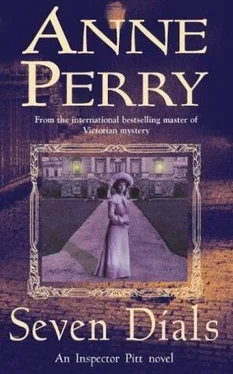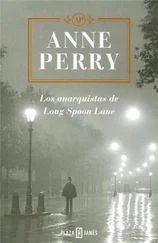Pitt stared at him. “Other men’s wives? Their daughters?”
Ragnall cleared his throat. “Yes… at times.”
“Who were his friends?” Pitt asked. “What clubs did he belong to? What were his interests, sports? Did he gamble, go to the theater? What did he do in his leisure time?”
Ragnall hesitated.
“Don’t tell me you don’t know,” Pitt warned. “The man was in the diplomatic service. You could not allow yourself to be unaware of his habits. That would be incompetent. You must know his associates, his problems, his financial status.”
Ragnall looked down at his hands, spread on the desk, then up at Pitt again. “The man is dead,” he said quietly. “I have no idea whether that was pure misfortune or if he contributed to it in some way himself, greatly, or very little. He was good at his job. I am unaware of him owing anyone money or, as far as I know, favors. He came from a good family, and he kept his word once he had given it. He had an honorable career in the army and he never lacked either physical or moral courage. I never caught him in a lie, nor do I know anyone who did. He was loyal to his friends, and he knew how to conduct himself as a gentleman. He had a certain charm, and there was nothing mean-spirited in him.”
Pitt felt the wave of regret he always did when investigating a murder. Suddenly the truth of detail was overwhelmed by the loss of a life, the passion, the vulnerability, the virtues and the idiosyncrasies. The vitality of being was ended, not naturally in age, but without warning, and incomplete. The fault or the contributing sins of the person concerned seemed so unimportant as to be forgotten.
But emotion would cripple his analytical mind, and his job was to find the truth, easy or difficult, complicated and however painful.
“The names of his friends,” he said aloud. “I may find him innocent of all blame, Mr. Ragnall, but I cannot assume. If Miss Zakhari, or anyone else, is to be hanged for his murder, it will be because we know what happened, and why.”
“Yes, of course.” Ragnall pulled a piece of paper towards himself and picked up a pen, dipped it in the ink and began to write. He blotted it and pushed it towards Pitt.
“Thank you.” Pitt took it, glanced at it and read the names, and the clubs at which they might be found, then took his leave.
PITT SAW ONE or two of the people Ragnall had suggested, and learned very little more. No one was comfortable discussing a colleague who was dead, and unable to defend himself. It was not a matter of affection so much as loyalty to their own ideals, perhaps in the belief that to betray was to invite a similar betrayal yourself, when your own weaknesses were questioned.
By midafternoon Pitt had given up the hope of finding anything useful this way, and decided to go and see his brother-in-law, Jack Radley, who had now been a Member of Parliament for a number of years, some of it with particular interest in the Foreign Office.
He was not in the House of Commons, and Pitt caught up with him just after four o’clock, walking in the sun across St. James’s Park, a slight breeze sending a few early yellow leaves fluttering down over the grass.
Jack stopped and turned when he heard Pitt call his name. He was surprised to see him, but not displeased.
“The Eden Lodge case?” he said wryly as Pitt fell into step with him.
“Sorry,” Pitt apologized. They had a genuine liking for each other, but their social circles as well as their professions kept them apart almost all the time. Jack had no money of his own, but he had always managed to live as well as his good birth invited. To begin with, it had been by liberal use of his great personal charm. Since marrying Emily, it was on the fortunes she had inherited from her first husband.
For the first year or two he had been content to continue merely enjoying himself in society. Then, with Emily’s pushing, and some example of Pitt’s, and possibly the respect he had observed both his wife and her sister had for achievement, he had taken up a vivid interest in politics. That did not alter the fact that he and Pitt met seldom.
“I don’t know Ryerson,” Jack said regretfully. “Bit above my political reach… for the time being.” He saw Pitt’s face. “I mean I intend to climb,” he corrected quickly, “not that I think he is going to fall. Is he?” Now his expression was suddenly very serious.
“Too early to say,” Pitt replied. “No, I’m not being discreet. I really don’t know.” He pushed his hands into his pockets, a dramatic contrast to Jack, who would never have dreamed of doing so. It would ruin the line of his clothes, and he was far too innately elegant to do that.
“I wish I could help,” Jack said with implied apology. “It all seems ridiculous, from what I’ve heard.”
A small black-and-white dog was charging around, wagging its tail with excitement. It did not seem to belong to the courting couple near the trees, or to the nursemaid in starched uniform, the sun shining on the fair hair escaping her white cap as she pushed a perambulator along the path.
Pitt bent and picked up a piece of stick and threw it as far as he could. The dog hared after it, barking with excitement.
“Did you know Lovat?” he asked.
Jack glanced sideways at him, unhappiness in his eyes. “Not well.”
Pitt could not afford to let him escape so lightly. “He’s been murdered, Jack. If it were not important I wouldn’t ask.”
Jack looked startled. “Special Branch?” he said with disbelief. “Why? Is there something in the Ryerson speculation? I thought it was just the newspapers.”
“I don’t know what it is,” Pitt retorted. “And I need to know, preferably before they do. Did you know Lovat? Without the censorship of decency toward the dead.”
Jack’s mouth tightened and he stared into the distance.
The dog came galloping up to Pitt and dropped the stick, dancing backwards in anticipation, gazing up at him.
He bent, picked up the stick and pitched it far again. The dog hurtled after it, ears and tail flying.
“A difficult man,” Jack said at last. “An ideal candidate for murder, I suppose, in a way. Actually, I’m damned sorry it happened.” He turned to look at Pitt. “Tread softly, Thomas, if you can. There are a lot of people who could be hurt, and they don’t deserve it. The man was a bastard where women were concerned. If he’d stayed with the sort of married women who’ve had their children and now play the field a bit, no one would have minded a lot, but he courted women as if he loved them, young women expecting marriage, needing it, and then once he had them, he suddenly cried off. Left everyone wondering what was the matter with them. The conclusion was usually that they had lost their virtue. Then, of course, nobody else wanted them either.” He did not need to paint a further picture. They both knew what lay ahead for an unmarriageable woman.
“Why?” Pitt said miserably. “Why court a decent woman you have no intention of marrying? It’s cruel… and dangerous. I’d-” He stopped, but in his mind he thought for a moment of Jemima, trusting, eager, so easy to hurt. If a man had done that to her, Pitt would have wanted to kill him, but not shoot him cleanly in someone else’s garden in the middle of the night. He would have wanted to beat him to a pulp first, feel the crack of bone on bone, the impact of his fist on flesh, see the pain, and the understanding of why it was happening. It was probably primitive, and would be of no help at all to Jemima, except to let her know she was of infinite value to someone and that she was not alone in her pain. And it would serve the point at least that the man would be a great deal less inclined to do it again.
He looked sideways at Jack, and saw something of the same raw anger in his face. Perhaps he was thinking of his own daughter, barely more than a baby.
Читать дальше












